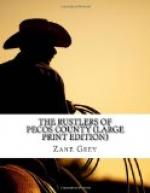Perhaps only then did wild and lawless Linrock grasp the real significance of this Ranger.
Steele threw the ax at Martin’s feet.
“Martin, don’t reopen here,” he said curtly. “Don’t start another place in Linrock. If you do—jail at Austin for years.”
Martin, livid and scowling, yet seemingly dazed with what had occurred, slunk away, accompanied by his cronies. Steele took the money I had appropriated, returned to me what I had lost, did likewise with the cattleman, and then, taking out the sum named by Mrs. Price, he divided the balance with the other players who had been in the game.
Then he stalked off through the crowd as if he knew that men who slunk from facing him would not have nerve enough to attack him even from behind.
“Wal, damn me!” ejaculated the little cattleman in mingled admiration and satisfaction. “So thet’s that Texas Ranger, Steele, hey? Never seen him before. All Texas, thet Ranger!”
I lingered downtown as much to enjoy the sensation as to gain the different points of view.
No doubt about the sensation! In one hour every male resident of Linrock and almost every female had viewed the wreck of Martin’s place. A fire could not have created half the excitement.
And in that excitement both men and women gave vent to speech they might not have voiced at a calmer moment. The women, at least, were not afraid to talk, and I made mental note of the things they said.
“Did he do it all alone?”
“Thank God a man’s come to Linrock.”
“Good for Molly Price!”
“Oh, it’ll make bad times for Linrock.”
It almost seemed that all the women were glad, and this was in itself a vindication of the Ranger’s idea of law.
The men, however—Blandy, proprietor of the Hope So, and others of his ilk, together with the whole brood of idle gaming loungers, and in fact even storekeepers, ranchers, cowboys—all shook their heads sullenly or doubtfully.
Striking indeed now was the absence of any joking. Steele had showed his hand, and, as one gambler said: “It’s a hard hand to call.”
The truth was, this Ranger Service was hateful to the free-and-easy Texan who lived by anything except hard and honest work, and it was damnably hateful to the lawless class. Steele’s authority, now obvious to all, was unlimited; it could go as far as he had power to carry it.
From present indications that power might be considerable. The work of native sheriffs and constables in western Texas had been a farce, an utter failure. If an honest native of a community undertook to be a sheriff he became immediately a target for rowdy cowboys and other vicious elements.
Many a town south and west of San Antonio owed its peace and prosperity to Rangers, and only to them. They had killed or driven out the criminals. They interpreted the law for themselves, and it was only such an attitude toward law—the stern, uncompromising, implacable extermination of the lawless—that was going to do for all Texas what it had done for part.




